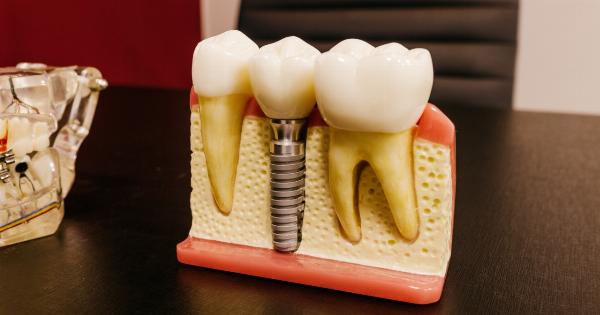Thirst is the body’s way of signaling that it needs hydration. It is a natural sensation that prompts us to drink fluids to maintain optimal bodily functions.
However, when thirst becomes a chronic issue, it may indicate an underlying health problem that requires attention. In this article, we will explore the various causes and potential solutions for chronic thirst.
Understanding Thirst
Thirst is a mechanism controlled by the hypothalamus, a region in the brain. When the body’s fluid levels drop, the hypothalamus sends signals to increase the sensation of thirst, prompting us to drink more fluids.
This is essential for maintaining the body’s water balance or what is medically known as homeostasis.
Causes of Chronic Thirst
While occasional thirst is normal, chronic thirst can be indicative of an underlying issue. Here are some potential causes of chronic thirst:.
1. Dehydration
The most obvious cause of chronic thirst is dehydration. When the body does not receive an adequate amount of fluids, it triggers the sensation of thirst to encourage intake.
Chronic dehydration can be caused by insufficient water intake, excessive sweating, certain medications, or medical conditions such as diabetes.
2. Diabetes
Diabetes, specifically type 1 diabetes, can lead to chronic thirst. In this condition, the body does not produce enough insulin or cannot effectively use the insulin it produces.
High blood sugar levels can cause frequent urination, which leads to increased fluid loss and subsequently triggers excessive thirst.
3. Medications
Some medications, such as diuretics, antihistamines, and certain antidepressants, can cause increased thirst as a side effect. These medications can alter the body’s fluid balance, leading to a persistent feeling of thirst.
4. Dry Mouth
Individuals with dry mouth, medically known as xerostomia, may experience chronic thirst. Dry mouth can be caused by various factors, including medications, certain medical conditions, mouth breathing, or simply not drinking enough water.
5. Excessive Salt Intake
A high intake of salty foods can disrupt the body’s fluid balance. Consuming excessive amounts of salt can lead to an increased feeling of thirst as the body attempts to restore the balance of fluids by encouraging fluid consumption.
6. Kidney Issues
Problems with kidney function, such as kidney disease or infection, can affect the body’s ability to regulate fluid levels. This can result in increased thirst due to the body’s inability to effectively filter and remove excess fluids.
7. Hypercalcemia
Hypercalcemia is a condition characterized by high levels of calcium in the blood. Excessive calcium can cause dehydration, leading to persistent thirst.
Hypercalcemia may be caused by underlying medical conditions, such as hyperparathyroidism or certain types of cancer.
8. Psychogenic Polydipsia
Psychogenic polydipsia is a condition where individuals have an excessive and uncontrollable urge to drink water. It is often associated with mental health disorders, such as schizophrenia or bipolar disorder.
The exact cause of psychogenic polydipsia is not fully understood but is believed to involve disturbances in the brain’s regulation of thirst.
Managing Chronic Thirst
Managing chronic thirst involves identifying and addressing the underlying cause. Here are some potential strategies:.
1. Increase Fluid Intake
If dehydration is the primary cause of chronic thirst, increasing fluid intake is crucial. Aim to drink an adequate amount of water each day, especially if you engage in physical activity or live in a hot climate.
Remember to listen to your body and drink when you feel thirsty.
2. Address Underlying Conditions
If a medical condition, such as diabetes or kidney issues, is causing chronic thirst, it is essential to work with a healthcare professional to manage and treat the underlying condition.
By effectively managing the condition, excessive thirst can be alleviated.
3. Adjust Medications
If medications are the culprit behind chronic thirst, consult with a healthcare professional to explore potential alternatives or adjustments to the dosage.
They may be able to prescribe alternative medications with fewer side effects or recommend additional measures to mitigate the excessive thirst.
4. Reduce Salt Intake
If excessive salt intake is contributing to chronic thirst, reducing the consumption of salty foods can help restore fluid balance in the body.
Opt for low-sodium alternatives and include more fresh fruits and vegetables in your diet to promote hydration.
5. Address Dry Mouth
If dry mouth is the underlying cause of chronic thirst, there are several strategies to consider.
These include staying hydrated by sipping water throughout the day, using saliva substitutes or oral moisturizers, and addressing any underlying medical conditions that may be causing dry mouth.
Conclusion
Chronic thirst is not something to ignore, as it can be a sign of an underlying health issue.
By understanding the potential causes and implementing appropriate management strategies, it is possible to alleviate chronic thirst and improve overall well-being. If you are experiencing persistent thirst, it is advisable to consult with a healthcare professional for an accurate diagnosis and personalized treatment plan.



























